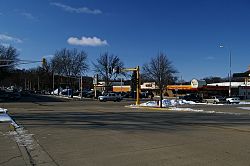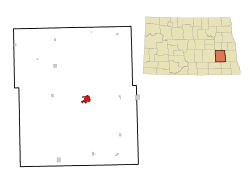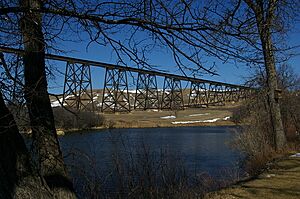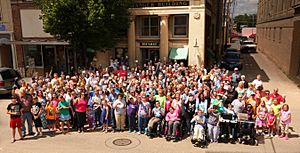Valley City, North Dakota facts for kids
Quick facts for kids
Valley City, North Dakota
|
||
|---|---|---|

Central Ave and Main Street in Valley City
|
||
|
||
| Motto(s):
"City of Bridges"
|
||

Location of Valley City, North Dakota
|
||
| Country | United States | |
| State | North Dakota | |
| County | Barnes | |
| Founded | 1872 | |
| Established | 1874 | |
| Incorporated (village) | 1881 | |
| Incorporated (city) | 1883 | |
| Area | ||
| • City | 4.300 sq mi (11.14 km2) | |
| • Land | 4.296 sq mi (11.13 km2) | |
| • Water | 0.004 sq mi (0.010 km2) | |
| Elevation | 1,221 ft (372 m) | |
| Population
(2020)
|
||
| • City | 6,575 | |
| • Estimate
(2023)
|
6,551 | |
| • Density | 1,524.99/sq mi (588.81/km2) | |
| • Urban | 6,547 | |
| • Metro | 10,726 | |
| Time zone | UTC–6 (Central (CST)) | |
| • Summer (DST) | UTC–5 (CDT) | |
| ZIP Code |
58072
|
|
| Area code(s) | 701 | |
| FIPS code | 38-81180 | |
| GNIS feature ID | 1032618 | |
| Highways | I-94, I-94 Bus. | |
| Sales tax | 7.5% | |
Valley City is a city in North Dakota, United States. It is the main city of Barnes County, North Dakota. In 2020, about 6,575 people lived there. This makes it the 12th largest city in North Dakota. Valley City was started in 1874.
Valley City is famous for its many bridges. These bridges cross the Sheyenne River. One well-known bridge is the Hi-Line Railroad Bridge. Because of all its bridges, the city is called the "City of Bridges." Valley City is also home to Valley City State University. It also hosts the North Dakota High School Activities Association (NDHSAA).
Contents
History of Valley City
Valley City began in 1874 when a railroad station was built. The town was first called Worthington. This name came from George Worthington, who helped start the town. Later, the name changed to Valley City. This new name describes its location in the valley of the Sheyenne River. A post office opened in 1874 as Worthington. It has been called Valley City since 1878.
A Carnegie Library opened in 1903. A local women's group called the "Tuesday Club" helped make this happen. In February 1909, the first barber association in the country started in Valley City. This happened during a state barber meeting.
Geography and Location
Valley City is located at 46°55′23.93″N 98°00′11.36″W / 46.9233139°N 98.0031556°W.
The city covers a total area of about 4.300 square miles (11.14 square kilometers). Most of this area is land. Only a very small part is water.
Population and People
| Historical population | |||
|---|---|---|---|
| Census | Pop. | %± | |
| 1880 | 302 | — | |
| 1890 | 1,089 | 260.6% | |
| 1900 | 2,446 | 124.6% | |
| 1910 | 4,606 | 88.3% | |
| 1920 | 4,686 | 1.7% | |
| 1930 | 5,268 | 12.4% | |
| 1940 | 5,917 | 12.3% | |
| 1950 | 6,851 | 15.8% | |
| 1960 | 7,809 | 14.0% | |
| 1970 | 7,843 | 0.4% | |
| 1980 | 7,774 | −0.9% | |
| 1990 | 7,163 | −7.9% | |
| 2000 | 6,826 | −4.7% | |
| 2010 | 6,585 | −3.5% | |
| 2020 | 6,575 | −0.2% | |
| 2023 (est.) | 6,551 | −0.5% | |
| U.S. Decennial Census 2020 Census |
|||
In 2022, there were about 3,039 homes in Valley City. Each home had about 1.96 people. The average income for a household was $52,224. About 16.4% of the people lived below the poverty line. About 63.9% of the people had jobs. Also, 28.9% had a college degree or higher. Most people, 94.3%, had a high school diploma.
People in Valley City reported their family backgrounds. The top five were English (95.4%), Spanish (0.7%), Indo-European (1.5%), Asian and Pacific Islander (2.0%), and Other (0.4%). The average age of people in the city was 39.1 years old.
Population in 2020
In 2020, there were 6,575 people living in Valley City. There were 2,966 households and 1,454 families. The city had about 1581.3 people per square mile. There were 3,391 housing units.
Most people in the city were White (90.22%). Other groups included African American (2.77%), Native American (1.19%), and Asian (1.02%). About 2.22% of the population was Hispanic or Latino.
About 21.2% of residents were under 18 years old. About 5.1% were under 5 years old. And 20.6% were 65 years or older. The population was almost evenly split between males (50.3%) and females (49.7%).
Population in 2010
In 2010, Valley City had 6,585 people. There were 2,986 households and 1,563 families. The population density was about 1903.5 people per square mile. There were 3,307 housing units.
The racial makeup was mostly White (95.22%). Other groups included African American (1.25%), Native American (0.73%), and Asian (0.82%). About 1.46% of the population was Hispanic or Latino.
Of the households, 22.6% had children under 18. About 41.1% were married couples. The average household size was 2.04 people. The average family size was 2.74 people.
The median age was 42.1 years. About 18.7% of residents were under 18. About 13.2% were between 18 and 24. And 22.0% were 65 or older. The city was 48.1% male and 51.9% female.
Local Media and News
Valley City has its own local media.
Radio Stations
- AM Radio:
- 1490 AM: KOVC "The Voice of the Valley KOVC" plays country music.
- FM Radio:
- 96.3 FM: K242CZ "The Voice of the Valley KOVC" also plays country music.
- 102.7 FM: K274BH "Ted FM" plays adult contemporary music.
Newspaper
The local newspaper for Valley City is the Valley City Times-Record.
Education in Valley City
Valley City offers education from kindergarten to college.
Schools for Kids
The Valley City Public School District serves students. It includes:
- Jefferson Elementary School
- Washington Elementary School
- Valley City Junior/Senior High School
- Valley City Christian School
St. Catherine's Catholic School also teaches students from kindergarten to 6th grade.
Higher Education
- Valley City State University is a college located in Valley City.
Places to Visit
Valley City has several interesting places to see:
- Hi-Line Railroad Bridge: A famous bridge in the city.
- North Dakota Winter Show: A popular event held in the city.
- North Country Trail: A long hiking trail that passes through the area.
- The Rosebud Visitor Center: This center has a restored old railway passenger car.
- The Vault (Coffee Shop): A unique coffee shop that uses an honor system.
Transportation Around the City
Getting around Valley City is easy with different transport options.
- Bus Service: Jefferson Lines provides bus service to and from the city.
- Local Transit: South Central Transit offers a local ride service. It runs on weekdays and weekends for a small fee.
- Bikeshare: Valley City Parks and Recreation has a bikeshare system. You can find a station at the Gaukler Family Wellness Center.
Famous People from Valley City
Many notable people have connections to Valley City:
- Jeff Boschee: A former professional basketball player.
- Paul Fjelde: A sculptor and professor.
- Peggy Lee: A famous jazz and popular music singer and songwriter.
- George W. Mason: A business leader who led Kelvinator and American Motors Company.
- James M. McPherson: A historian who won a Pulitzer Prize.
- Earl Pomeroy: A former congressman.
- Ann Sothern: A film and TV actress with two stars on the Hollywood Walk of Fame.
- Herman Stern: A businessman and humanitarian.
- Tyrell Terry: A professional basketball player.
- Frank White: A former governor of North Dakota.
Climate and Weather
Valley City has a climate with big changes in temperature during the year. Summers are warm to hot and often humid. Winters are cold, sometimes very cold. This type of weather is called a humid continental climate.
See also
 In Spanish: Valley City (Dakota del Norte) para niños
In Spanish: Valley City (Dakota del Norte) para niños




